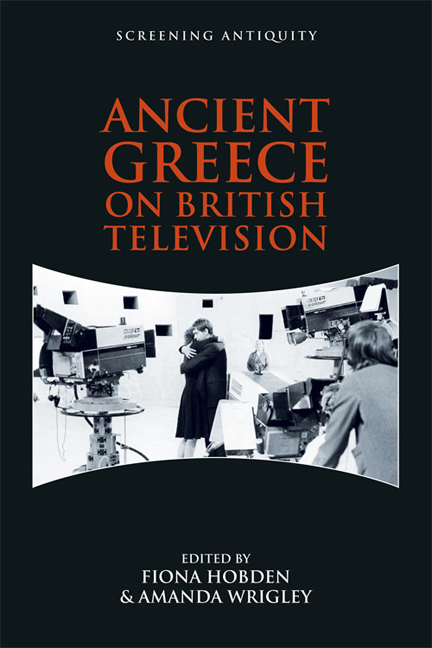Book contents
- Frontmatter
- Contents
- List of Figures and Tables
- Series Editors’ Preface
- Acknowledgements
- Contributors
- Abbreviations
- Broadcasting Greece: An Introduction to Greek Antiquity on the Small Screen
- 1 Are We the Greeks? Understanding Antiquity and Ourselves in Television Documentaries
- 2 Louis MacNeice and ‘The Paragons of Hellas’: Ancient Greece as Radio Propaganda
- 3 The Beginnings of Civilisation: Television Travels to Greece with Mortimer Wheeler and Compton Mackenzie
- 4 Tragedy for Teens: Ancient Greek Tragedy on BBC and ITV Schools Television in the 1960s
- 5 The Serpent Son (1979): A Science Fiction Aesthetic?
- 6 Don Taylor, the ‘Old-Fashioned Populist’? The Theban Plays (1986) and Iphigenia at Aulis (1990): Production Choices and Audience Responses
- 7 The Odyssey in the ‘Broom Cupboard’: Ulysses 31 and Odysseus: The Greatest Hero of Them All on Children’s BBC, 1985–1986
- 8 Greek Myth in the Whoniverse
- 9 The Digital Aesthetic in ‘Atlantis: The Evidence’ (2010)
- 10 Greece in the Making: From Intention to Practicalities in Television Documentaries. A Conversation with Michael Scott and David Wilson
- Bibliography
- Index
2 - Louis MacNeice and ‘The Paragons of Hellas’: Ancient Greece as Radio Propaganda
Published online by Cambridge University Press: 24 April 2021
- Frontmatter
- Contents
- List of Figures and Tables
- Series Editors’ Preface
- Acknowledgements
- Contributors
- Abbreviations
- Broadcasting Greece: An Introduction to Greek Antiquity on the Small Screen
- 1 Are We the Greeks? Understanding Antiquity and Ourselves in Television Documentaries
- 2 Louis MacNeice and ‘The Paragons of Hellas’: Ancient Greece as Radio Propaganda
- 3 The Beginnings of Civilisation: Television Travels to Greece with Mortimer Wheeler and Compton Mackenzie
- 4 Tragedy for Teens: Ancient Greek Tragedy on BBC and ITV Schools Television in the 1960s
- 5 The Serpent Son (1979): A Science Fiction Aesthetic?
- 6 Don Taylor, the ‘Old-Fashioned Populist’? The Theban Plays (1986) and Iphigenia at Aulis (1990): Production Choices and Audience Responses
- 7 The Odyssey in the ‘Broom Cupboard’: Ulysses 31 and Odysseus: The Greatest Hero of Them All on Children’s BBC, 1985–1986
- 8 Greek Myth in the Whoniverse
- 9 The Digital Aesthetic in ‘Atlantis: The Evidence’ (2010)
- 10 Greece in the Making: From Intention to Practicalities in Television Documentaries. A Conversation with Michael Scott and David Wilson
- Bibliography
- Index
Summary
This chapter examines the ways in which Louis MacNeice employed and, at times, manipulated historical narratives of ancient Greece in radio feature programmes to provide encouraging parallels for the resilience, courage and determination required to survive fascist occupation in World War II and ultimately to overcome it. The primary aim of these programmes was to maintain awareness of and sympathy for an important ally on the Home Front through radio. MacNeice uses the artifice of viewing the present predicament of Greece through the prism of its ancient past. We may term his programmes propaganda in that their effects are intentionally rhetorical, though these broadcast features were not such as would require embarrassed explanations after the war.
At the time of the outbreak of war in 1939, BBC Radio was more established, more developed and much more widely available than its nascent television service, which had been available within a short radius of London's Alexandra Palace since 1936. With the latter shut down for the duration, radio was in any case the primary medium for the broadcasting of information and entertainment. Radio could reach the majority of the population: ‘by 1939, 73 per cent of households nationwide owned a radio licence, suggesting a potential audience of perhaps 35 million out of a total population of 48 million’. Transmissions reached a corner of most living rooms and, as Connelly has written, the war forced a change in domestic listening habits, with radio becoming more convenient than the newspapers: ‘With people working longer hours in complex shift patterns, the ability to read a newspaper from cover to cover diminished, thus making the radio the crucial source of information.’ Given this ubiquity, radio was also an effective means of propagandising the allied war effort, particularly through the evolving features genre.
It was the adaptable format of features programmes that was in the main used for BBC Radio wartime propaganda. Wrigley writes, ‘Strictly speaking, features may be described as radio documentaries or information programmes which utilise innovative combinations of dramatization, poetry, music and sound for their effect.’
- Type
- Chapter
- Information
- Ancient Greece on British Television , pp. 44 - 63Publisher: Edinburgh University PressPrint publication year: 2018

